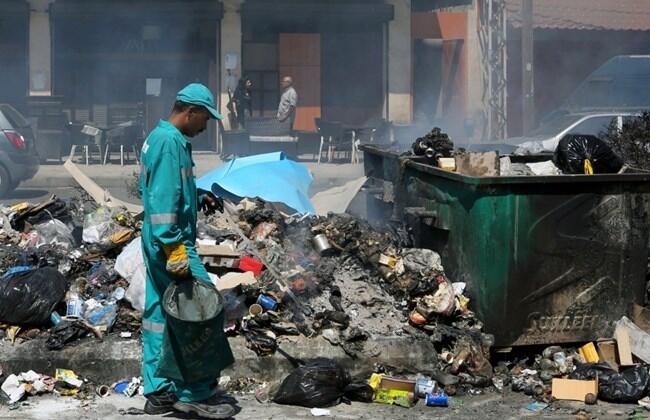BEIRUT: Residents awoke to find most of their garbage collected Thursday morning, 11 days after Sukleen, the capital region’s waste management contractor, suspended its services because it could not access its disposal grounds. An emergency plan has allowed the company to move trash off the streets and gather it in Karantina. Faint smells still wafted up in the heat, and calcium carbonate remained caked on the streets. Sukleen workers had been shoveling the nontoxic and nonreactive white powder liberally onto the piles of garbage as a temporary remedy for their noxious odors. The Cabinet Thursday discussed long-term solutions to the trash crisis but did not reach any agreements. Ministers considered a request from the Beirut Municipal Council to export the capital’s waste and finally wash their hands of the matter. The Cabinet also deliberated a plan to open a landfill in the Metn, at Ain Dara or Dahr al-Baidar, but Free Patriotic Movement ministers said they would refuse to accept Beirut’s waste in Kesrouan or the Metn. A scientist within the Environment Ministry warned Wednesday that establishing such a landfill atop one of the country’s richest aquifers would be an ecological disaster. For now, the capital is storing its trash inside the city. Chebib confirmed some was being kept in a lot in Karantina, opposite the Bakalian flour mill. A tall wall obstructs the view onto the property. The mill suspended its operations Wednesday out of hygienic concerns, but Health Minister Wael Abou Faour said an inspection revealed that the site as sanitary. “There’s no danger to the flour in the short term,” he said. Still, the minister decided to close the nearby fish market “for two or three days, as a precaution, until the waste issue is resolved.” The site is supposed to be temporary and Chebib insisted that any long-term trash management for Beirut would have to see the refuse moved outside the city. “We’re not dumping. We’re not landfilling. Beirut does not have and will not have any dumps or landfills inside of it,” he said. “When the Cabinet decides where to dispose the waste outside Beirut, then we will transfer the trash there.” In the event the Cabinet fails, Beirut’s Municipal Council asked for permission to export its trash abroad. “We’ve arrived here because the government hasn’t been able to find a place to send Beirut’s trash after they closed Naameh,” Beirut Mayor Bilal Hamad told The Daily Star, referring to the last landfill Sukleen used to bury Beirut and Mount Lebanon garbage. “The capacity we have in Karantina will not last more than 10 days,” Hamad said. The municipal council had convened an emergency session Thursday to deliberate the matter. “This decision [to export] comes in accordance with experts’ opinions,” it said in a statement afterward. “Specialists briefed the council on the repercussions of the waste crisis.” Sukleen is operating its Karantina and Amrousieh sorting plants to bale the collected trash, a process that reduces its toxicity. The Daily Star saw the company setting bales in a large dirt lot near the airport, in Khaldeh. A spokesperson said these came from the Shoueifat region. With the state unable to resolve the trash crisis for the past 10 days, Chebib said the severity forced Beirut to take emergency measures. “With the amount of garbage on the streets, it became a public health matter. A danger,” Chebib said. “It’s more than just a nuisance and an eyesore. Whole streets were blocked off. We had to gather [the trash] in places that are less hazardous than [leaving it on] the street.” By Thursday afternoon, Sukleen had collected 2,500 tons of accumulated garbage, according to Chebib. The city produces about 600 tons per day. Chebib said Sukleen is being paid its standard rate for its services. Reports indicate this is around $130-$170 per ton, among the highest rates in the world. Several Mount Lebanon municipalities opened makeshift dumps, initiated ad hoc collection services, and prepared to sell their waste to recycling. Others have asked Sukleen to resume its services. “Any municipality that finds an appropriate lot, we’re going to collect for them,” said Pascale Nassar, the company’s communications manager.











